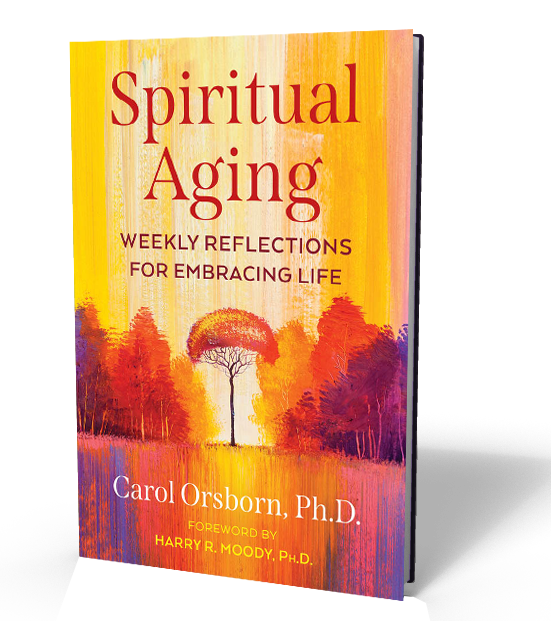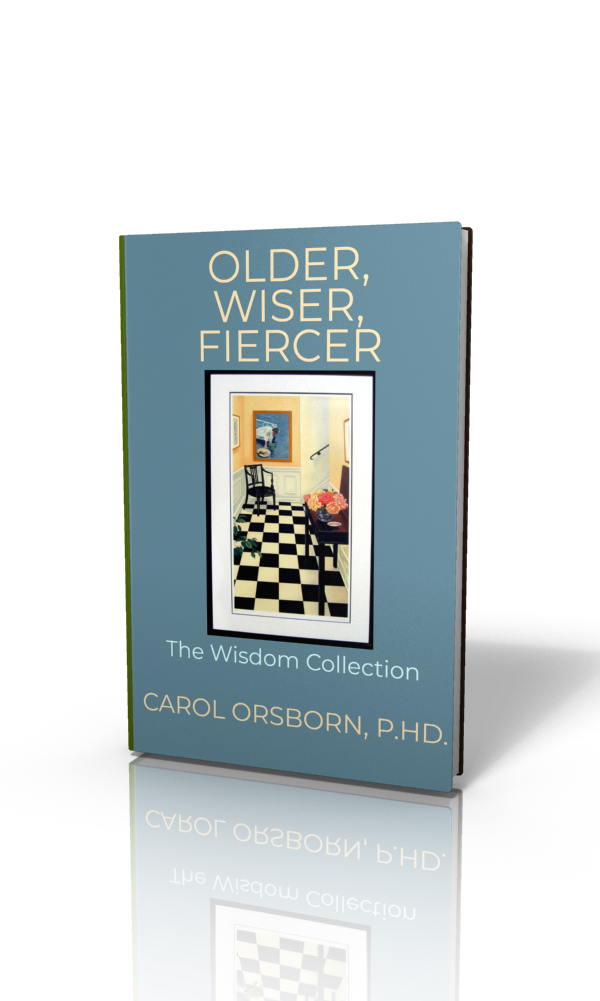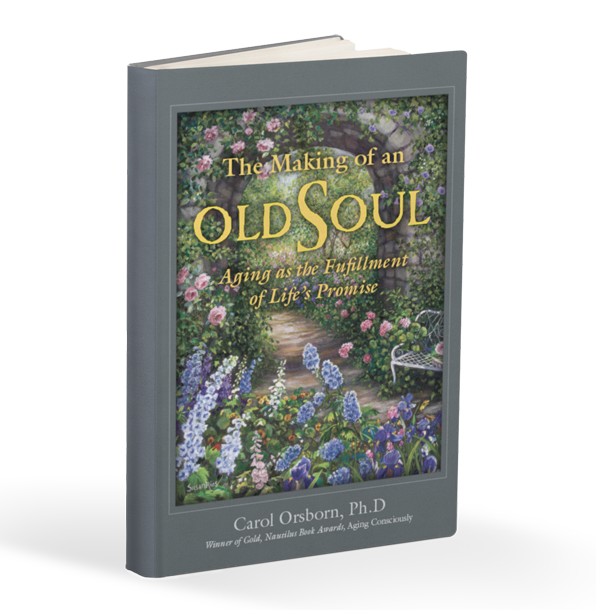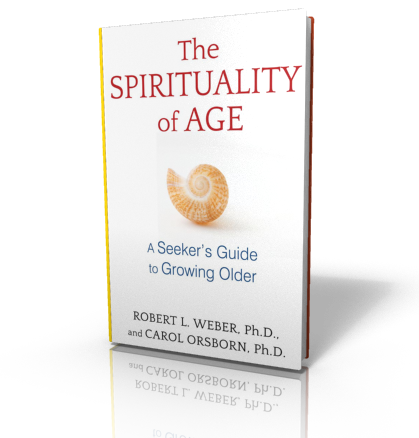When I speak before audiences, I often ask them to picture an old woman sitting alone on a park bench. Then I ask them to share the first image/thought/impulse that pops into their mind. The younger the audience, the more likely they are to feel sorry for the lonely woman who is probably in need of some kind of assistance. But more seasoned audience members often have a different response. “I wish it were me,” said one recently. “I’d love to be hanging out alone in a park somewhere enjoying nature.”
As it turns out, this simple image is a Rorschach test concerning the listener’s attitudes about aging. Those who view aging as decline and isolation—something to be feared or avoided—project these feelings on the woman sitting alone. But a growing number of us are turning the old stereotypes on their heads. Aging, as it turns out, can not only be a problem to be solved—but a transcendent experience.
So Moses. Moses, as it turns out, is another Rorschach test, this time having to do with attitudes about aging, mortality—and the meaning of life. This came to me recently, as I was preparing to give a talk about aging and spirituality before a temple audience. I was thinking a lot about Moses at the end of his life—you know, the one where after leading his people through the wilderness for 40 years he doesn’t get to enter the Promised Land. As it happened, I ended up at a meeting the day before with not just one but two rabbis. I learned an interesting lesson. If you want to get a big reaction from a rabbi, just ask them this question: “Was Moses happy at the end of his life?” Two big reactions—two very different responses.
The first, a young man, viewed Moses as mad and dismayed. After all, he had been promised entry. He did his part. Okay, so one little sin for which he was being punished—something about smoting a rock to get it to produce water which, for some inexplicable reason, God had forbidden. And poof—his dream up in smoke. So close, and yet so far. In fact, this rabbi told me a midrash about how traditional Jews viewed Moses at the end. Moses: crying so hard, the younger Joshua, the very one who did get to complete the journey, had to write the end of Five Books of Moses for him.
The second rabbi, a young woman but wise beyond her years, saw the end of Moses’ life differently. Yes, he was disappointed that he didn’t get to go into the Promised Land himself. Mad, frustrated, even. He did, after all, die before his task was complete. “But isn’t that how it is for all of us?” she asked me. “Don’t we all leave some things—even important ones—unfinished? At some point, do we get to say ‘I’ve done what I could—made the most of my time here’–and let go.” Moses, mind you, was 120 when he passed—and deserved to rest. The second rabbi pointed out that he died clear of eye and mind, surrounded by loved ones then she had a midrash of her own to add. “God kissed him and Moses slept.” So forgiven, whole, complete.
Did Moses die happy? Completion, the second rabbi advised, comes out of generativity—the knowledge that one has prepared the next generation to carry on our tasks, and passes the baton along with the culmination of all he has learned: his legacy. This Moses did. Not only did he have Joshua but an entire generation of leaders at the ready to venture forth, and he sends them off with all he has to give them: his hope that they will be good, to follow God’s way and to prosper.
If we hold the view of Moses as having failed, we are judging him—indeed, the meaning of life—solely through a goal-oriented lens. In this vision of life, all that matters is that we make it into the Promised Land, and that everybody who follows fulfills our dreams for them perfectly. (As an aside, so Moses also knew that human nature is bound to waver and people, even despite their will to do good, will forget, slip and falter. That wasn’t in his final speech, by the way, but while delivered earlier, still had to be at least in the back of his mind.) If all that matters is achieving our goals, we are, indeed, bound to be disappointed in the end. And not only frustration or righteous anger—but self-pity and despair. Life, as it turns out, is imperfect and happy endings have to come from some deeper place than simply fulfilling our dreams.
But through another lens, the lens of understanding, wisdom and compassion, we can still tell the truth about Moses’ anger, sadness and frustration, but also see Moses as a culmination of his own life story—ending, as does all of our stories, unfinished. After all, like Moses, the Five Books of Moses, which comprise the most sacred of Jewish texts, the Torah, do not end in the Promised Land, but in the wilderness. Moses: clear-eyed, clear-headed, surrounded by loved ones, proud of his accomplishments, empowering the next generation while still hoping and wishing for more.
Perhaps both midrash are true. Moses crying so hard he can’t write, and God kissing him lovingly into eternal rest. But I prefer to think of these as tears not of despair—but of reconciliation. Like the old woman sitting alone on a park bench having a transcendent experience, this is an understanding of Moses’ death—a vision of culmination—to which I aspire.
TO COMMENT: Please share your thoughts with me about this blog in the comment section below as it is posted at CarolOrsborn.com.
Note: The Conscious Aging Book Club is in the final days of discussion concerning our April selection Still Here by Ram Dass HERE The discussion culminates both online and in-person at Parnassus Books in Nashville, on Thursday, May 3 at 10:30 a.m.
_______________________________
To purchase Still Here, and our May selection The Measure of My Day by Florida Scott-Maxwell please support the Conscious Aging Book Club independent book store partner, Parnassus Books by clicking HERE.
To subscribe to our sister site Fierce with Age: The Free Digest of Boomer Wisdom, Inspiration and Spirituality, click HERE
You can email me directly at Carol@fiercewithage.com.
_______________________________
Carol Orsborn, Ph.D., is Founder of Fierce with Age, the free monthly Digest of Boomer Wisdom, Inspiration and Spirituality. Carol, who earned her doctorate in the history and critical theory of religion specializing in adult and spiritual development from Vanderbilt University, is the best-selling author of 30 books, including The Spirituality of Age: A Seeker’s Guide to Growing Older (co-author Dr. Robert L. Weber), winner of gold in the category of Consciously Aging, Nautilus Book Awards 2015. Carol’s blog Older, Wiser, Fiercer is available at CarolOrsborn.com.
Feel free to share this providing proper credit to Carol Orsborn
and a link to CarolOrsborn.com.








